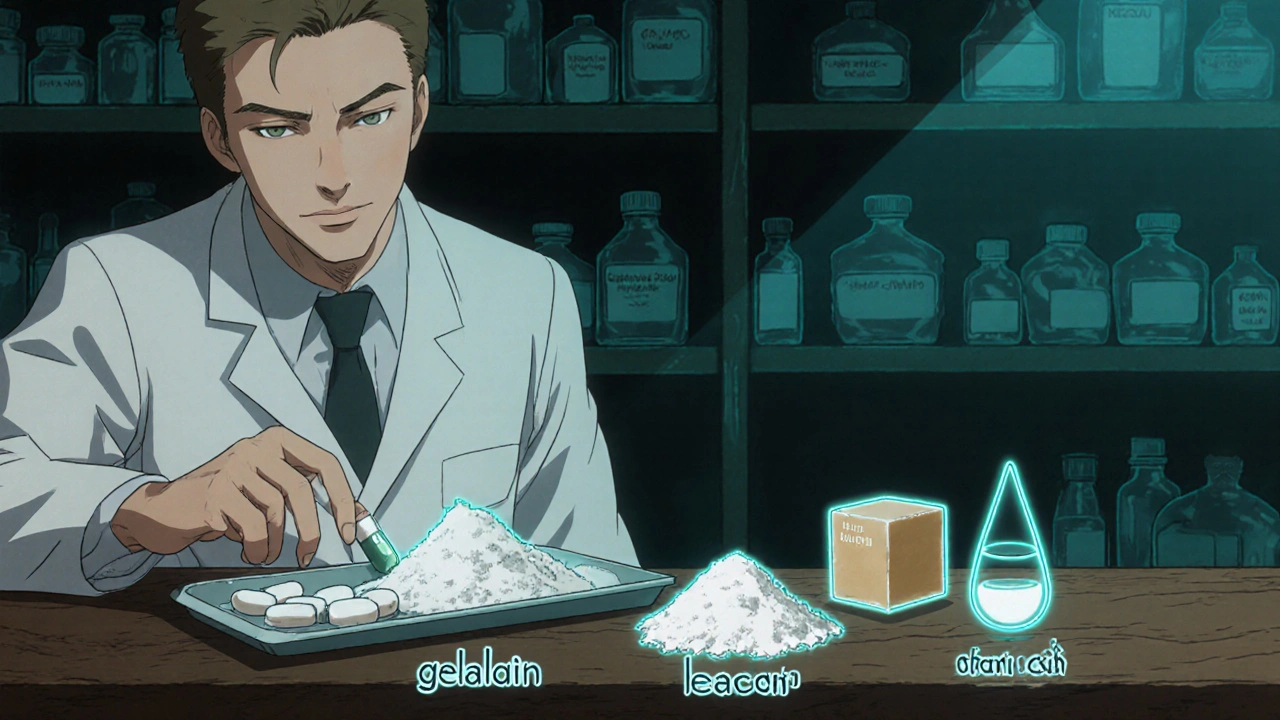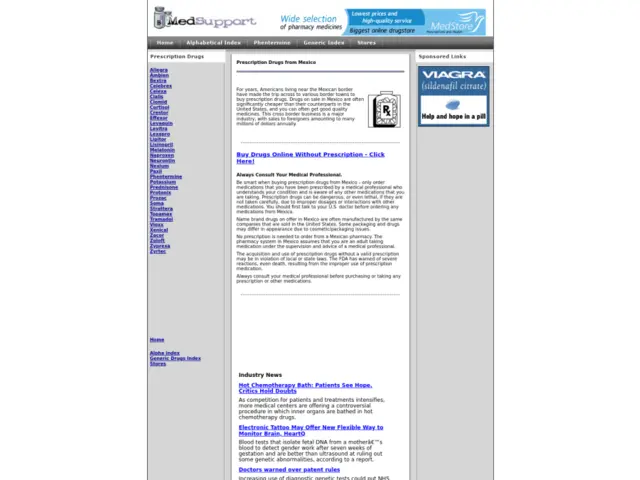Vegan Medication Checker
Check Your Medication for Animal Ingredients
Enter the name of your medication or supplement to see if it contains animal-derived ingredients like gelatin, magnesium stearate, lanolin, or stearic acid.
Results
Enter a medication name to see if it contains animal-derived ingredients.
Note: This tool provides general guidance based on common ingredients. Always consult your pharmacist or doctor for personalized advice regarding your specific medication.
Finding a medication that respects a vegan or vegetarian lifestyle can feel like searching for a needle in a haystack. Many pills, capsules, and even over‑the‑counter vitamins hide animal‑derived components that aren’t listed on the label. This guide breaks down the most common hidden ingredients, shows which drugs still lack vegan alternatives, and gives practical steps to verify that your next prescription aligns with your ethical choices.
Key Takeaways
- About half of supplements contain undisclosed animal by‑products.
- Gelatin, magnesium stearate, lanolin, and stearic acid (E570) are the top culprits.
- Some essential medicines - such as heparin, certain pancreatic enzymes, and propofol - have no vegan equivalents yet.
- Ask pharmacists for "vegan‑free" options and reference tools like Pill Clarity.
- Regulatory pressure is growing; more transparent labeling is expected after 2024.
Vegan medication decisions start with knowing what to look for. Below we define the core ingredients that commonly trip up ethical consumers.
Understanding Animal‑Derived Ingredients
Animal‑derived ingredients are substances sourced from parts of animals that are not typically eaten, such as bones, fat, skin, or glands. In pharmaceuticals they serve as binders, fillers, coatings, or even the active therapeutic component. While food labeling laws in many countries demand clear disclosure, medication labeling is far less stringent, allowing these ingredients to slip past the average consumer.
Common Culprits in Pills and Supplements
- Gelatin - a protein from pig, cow, or fish skin and bones; used in ~90% of hard‑shell capsules.
- Magnesium stearate - often derived from animal fat; works as a lubricant in tablets.
- Lanolin - wool‑derived wax, common in Vitamin D3 supplements.
- Stearic acid (E570) - can come from cow, sheep, or pig fat; used as an emulsifier.
- Glycerin - may be plant‑derived or animal‑derived; often used for moisture.
- Collagen - extracted from animal connective tissue; appears in some joint health supplements.

Medications with Hidden Animal By‑Products
Below are examples where animal components appear either as inactive excipients or as the active drug itself.
- Premarin - conjugated estrogens derived from pregnant mare’s urine; synthetic estrogen alternatives exist but are chemically distinct.
- Armour Thyroid - contains desiccated pig thyroid tissue; levothyroxine (synthetic T4) is a vegan‑compatible alternative.
- Heparin - sourced from pig intestines; low‑molecular‑weight heparin alternatives are still animal‑derived.
- Pancrelipase (Creon, Viokace) - derived from porcine pancreas; no approved vegan enzyme replacement yet.
- Vascepa (icosapent ethyl) - fish‑oil based; plant‑derived omega‑3 concentrates are emerging but not identical.
- Diprivan (propofol) - contains egg phospholipids; no non‑egg formulation currently available.
Vegan Alternatives & Gaps
For many over‑the‑counter supplements, plant‑based replacements exist. However, several critical therapies remain without a vegan counterpart.
| Product Type | Animal‑Derived Ingredient | Vegan Alternative | Notes |
|---|---|---|---|
| Capsule Shell | Gelatin (pig/cow) | Cellulose (HPMC) or pullulan | Widely available for prescription & OTC. |
| Vitamin D3 | Lanolin (sheep wool) or fish liver oil | Algae‑derived D3 (e.g., brand X) | Bioequivalent, vitamin D2 less effective. |
| Omega‑3 Supplements | Fish oil | Algal oil DHA/EPA | Similar EPA/DHA ratios, cheaper at scale. |
| Tablet Lubricant | Magnesium stearate (animal fat) | Plant‑based stearate or silicon dioxide | Often interchangeable. |
| Stearic Acid (E570) | Animal fat | Plant‑derived stearic acid | Must verify source. |
Even with alternatives, three high‑impact drugs still lack vegan versions: pancreatic enzymes, propofol, and marine‑derived omega‑3 capsules.
How to Verify Vegan‑Friendly Medications
- Ask your pharmacist directly: "Do you have a gelatin‑free version of this medication?" Include the list of ingredients you want to avoid (gelatin, magnesium stearate, lanolin, stearic acid, etc.).
- Check the Pill Clarity database. Pill Clarity (formerly VeganMed) certifies medications that have been reviewed for animal‑free status.
- Use the Transparent Label Campaign’s public reports to spot common animal constituents in supplements.
- Consult PETA’s online animal‑derived ingredient list for quick cross‑reference.
- When a drug has no vegan alternative, discuss the risk‑benefit ratio with your clinician and explore possible synthetic substitutes (e.g., synthetic levothyroxine for thyroid issues).

Resources & Certification Programs
Beyond Pill Clarity, several organizations provide tools for ethically minded patients:
- Transparent Label Campaign - releases annual audits of supplement ingredient disclosures.
- PETA’s Animal‑Derived Ingredients List - searchable database of common pharmaceutical additives.
- American Pharmacists Association (APhA) - developing guidelines (expected 2024) for pharmacists to address vegan medication queries.
Signing up for Pill Clarity’s newsletter keeps you in the loop about newly certified products and upcoming regulatory changes.
Future Outlook
Consumer demand is nudging the industry toward clearer labeling. The 2023 rebranding of VeganMed to Pill Clarity signaled a shift from niche vegan concerns to broader ingredient transparency for allergy‑prone and health‑conscious patients alike. GoodRx’s 2023 market analysis predicts that manufacturers will increase plant‑based excipient use by 15‑20% over the next five years, driven by both ethical consumer pressure and cost‑effective manufacturing advances.
Regulators in the UK and EU are also reviewing labeling standards. If the European Medicines Agency adopts stricter disclosure rules, future prescriptions may list animal‑derived excipients alongside active ingredients, dramatically simplifying the verification process.
Quick Checklist for Vegan Medication Shopping
- Identify the top animal‑derived excipients (gelatin, magnesium stearate, lanolin, stearic acid, glycerin).
- Ask pharmacist for a plant‑based capsule or tablet formulation.
- Search Pill Clarity or Transparent Label Campaign for certification.
- Document any unavoidable animal‑based active ingredients and discuss alternatives with your doctor.
- Stay updated on labeling reforms via reputable health news sources.
What medications are completely vegan?
Many over‑the‑counter vitamins, most antihistamines, standard antibiotics (e.g., amoxicillin), and synthetic thyroid hormone (levothyroxine) are formulated without animal ingredients. Always verify capsule shells and fillers with your pharmacist.
Can I trust a vegan label on prescription drugs?
Prescription drugs are not required to carry a vegan label in most regions. Independent certifications like Pill Clarity provide the most reliable verification.
Is gelatin the only animal ingredient I need to watch?
Gelatin is the most common, but magnesium stearate, lanolin, stearic acid (E570), glycerin, and collagen frequently appear in tablets and soft‑gel capsules.
What should I do if my essential medication has no vegan alternative?
Discuss the therapeutic necessity with your doctor. In some cases, synthetic analogues (e.g., synthetic estrogen) can replace animal‑derived drugs, or the benefit may outweigh the ethical concern.
How often do manufacturers update ingredient lists?
Changes are sporadic. Major reformulations happen roughly every 2‑3 years, often driven by supply chain shifts or new regulatory guidance.





eko lennon - 25 October 2025
When I first stared at the endless list of ingredients on a bottle of pills, my heart sank like a stone dropped in a quiet lake, and I could feel the drama of my ethical dilemma unfolding before my very eyes.
Every gelatin capsule seemed to whisper the secrets of hidden animal sacrifice, and I could not help but imagine the silent cries of the beasts whose skins were melted into those glossy shells.
The realization that even a simple magnesium stearate might be sourced from the fat of a pig made my mind race through corridors of moral horror, each step echoing the weight of centuries of animal exploitation.
I began a quest, digging through scientific journals, scouring pharmacist forums, and even consulting with Buddhist monks who shared their own stories of navigating the pharmaceutical labyrinth.
The journey was long and winding, fraught with contradictory labels, corporate doublespeak, and the occasional bittersweet triumph when a vegan-certified supplement finally emerged from the shadows.
Along the way, I learned that lanolin, a waxy substance harvested from sheep's wool, functions not only as a moisturizer in creams but also as a binding agent in certain vitamin D3 formulations, stunning me with its ubiquitous presence.
Stearic acid, often marked as E570, revealed itself as a chameleon, able to be derived from either plant or animal fats, turning each pharmacy shelf into a guessing game of ethical roulette.
Even glycerin, a seemingly innocuous humectant, can be sourced from the livers of cattle, and this revelation sent tremors through my previously held assumptions about 'natural' products.
As I catalogued these hidden ingredients, I discovered that the pharmaceutical industry, while striving for efficacy, often overlooks the compassionate consumer, leaving us to navigate the murky waters of animal-derived excipients alone.
The emotional weight of this knowledge is profound, yet it also fuels a fire within me to advocate for transparent labeling, to demand that manufacturers disclose the true origins of every component.
I have begun to share this knowledge with fellow vegans, clinicians, and even policy makers, hoping that a collective voice will compel change.
There is a growing movement, as the guide points out, where regulatory bodies are beginning to recognize the importance of disclosing these components, and I see that as a beacon of hope.
My own practice now includes always asking pharmacists for 'vegan‑free' versions, and I am pleased to report that many have been able to offer alternatives made from cellulose or pullulan capsular shells.
When such alternatives are unavailable, I discuss with my doctor the risk‑benefit ratio, weighing my health needs against my ethical commitments.
Ultimately, this saga is not just about pills; it is about the courage to align our health choices with our deepest values, and the drama of this alignment is a story worth telling again and again.
Sunita Basnet - 27 October 2025
Hey team lets leverage this guide as a catalyst for synergy in vegan health advocacy its a win win scenario for patients and pharma
Melody Barton - 28 October 2025
Listen up I’m not here to sugarcoat anything – check every label and demand plant‑based capsules. It’s simple, it works, and you deserve transparency.
Justin Scherer - 30 October 2025
Just a heads up – when you ask the pharmacist, be specific about gelatin, magnesium stearate, and lanolin. Most will point you to a vegan alternative if it exists.
Cheyanne Moxley - 31 October 2025
Honestly it’s sickening how many people ignore the animal cruelty baked into these drugs. We should be outraged and demand the industry fix this mess right now.
Kevin Stratton - 2 November 2025
One might ponder the metaphysical implications of consuming animal‑derived excipients while claiming a compassionate lifestyle; perhaps the universe is nudging us toward greater integrity :)
Manish Verma - 3 November 2025
As an Aussie, I’m proud of our push for clean labels, but some overseas firms still seem stuck in the past. It’s high time they catch up or be left behind.
Greg Galivan - 5 November 2025
Ths guide is vry good but many peple cant even read the tiny font on med bottles. You need to ask the phamarist in plain words.
Edward Brown - 6 November 2025
They dont tell you that big pharma is in cahoots with labs to hide animal stuff its all a cover up and you cant trust the info they give
Donal Hinely - 8 November 2025
Whoa, this is a kaleidoscope of info! Dive in, grab those vegan pills, and blast the old‑school pharma with some colorful, cruelty‑free love.
christine badilla - 9 November 2025
Seriously, I’m freaking out over every pill now!